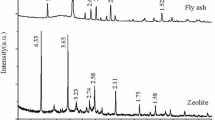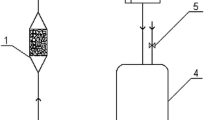Abstract
Spent zeolites from petroleum refining processes can be used for the extraction and concentration of toxic elements (As, Pb, and Hg) from wastewater because they possess a better sorption capacity in comparison with that of the KAD-iodine commercial sorbent intended for the purification of wastewater. The amounts of arsenic and mercury concentrated on zeolite surfaces for 120 h were greater than their amounts in the purified wastewater by factors of 4 and 16, respectively. The degree of removal of the cesium-137 radionuclide from wastewater by spent zeolites was higher by two orders of magnitude than those for natural sorbents and the BAU carbon adsorbent, and this value for 60Co was higher by an order of magnitude.
Similar content being viewed by others
References
Pokonova, Yu.V. and Grabovskii, A.I., Tsvetn. Met., 1995, no. 5, p. 26.
Neimark, N.E., Izv. Akad. Nauk SSSR, Ser. Khim., 1965, no. 6, p. 95.
GOST (State Standard) 29114-91: Radioactive Wastes: Methods for Measuring the Chemical Stability of Solidified Wastes by Long-Term Leaching, Moscow: Izd. Standartov, 1992, p. 56.
Barinov, A., Radiokhimiya, 1990, vol. 32, no. 4, p. 127.
Author information
Authors and Affiliations
Corresponding author
Additional information
Original Russian Text © Yu.V. Pokonova, 2012, published in Khimiya Tverdogo Topliva, 2012, No. 3, pp. 42–48.
About this article
Cite this article
Pokonova, Y.V. Adsorbents from spent zeolites. Solid Fuel Chem. 46, 179–184 (2012). https://doi.org/10.3103/S0361521912030111
Received:
Published:
Issue Date:
DOI: https://doi.org/10.3103/S0361521912030111




